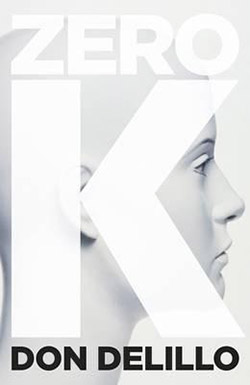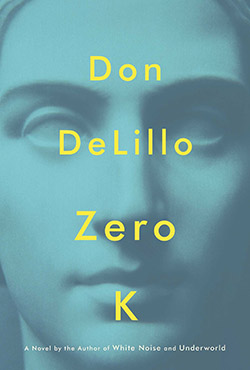“Everybody wants to own the end of the world,” begins Don DeLillo’s first new novel since Point Omega in 2010, and like the finest opening lines, Zero K’s is soaked through with significance.
Fittingly for a work of fiction interested in “fathers and sons,” this is a remark Ross Lockhart, a billionaire in his sixties, makes to Jeffrey—his aimless heir, and our narrator—as they stand in his opulent New York office, surrounded on all sides by abstract art and other markers of money: motifs readers will encounter repeatedly as they make their way through Zero K. It’s important to note, furthermore, that this phrase is not spoken in the moment, but rather recalled by “a man propelled into obsessive reflection.”
As to the words themselves… well. To own is to possess, yes, but these days, it also denotes domination, and this is what Ross wants: to use his dollars to dominate the end of the world. That’s not to say the apocalypse, but the end of the world as we mere mortals perceive it, at the very end of our selves—in death.
Ross makes this startling statement, we learn a little later, because his second wife Artis Martineau is dying. But the owner and operator of the Lockhart fortune isn’t a man so easily beaten. See, he’s been led to believe that his riches might give her a future in the future, which is why he’s flown her to the home of a clinical cult called Convergence, where—in exchange for substantial donation, I dare say—she’ll be frozen at a temperature approaching absolute zero in her last moments, to be re-awoken one day, decades or centuries or millennia hence, when medicine is in a position to correct her condition.
Jeffrey, who’s been invited to attend his stepmother’s impending end, doesn’t share his powerful father’s new-found faith. As a matter of fact, the prospect of what Artemis is about to be put through horrifies him:
They would come and take her. They would wheel her into an elevator and take her down to one of the so-called numbered levels. She would die, chemically prompted, in a subzero vault, in a highly precise medical procedure guided by mass delusion, by superstition and arrogance and self-deception.
But before that happens, he has to endure days of waiting. “Days in middling drift” during which he wanders without context around the Convergence compound. And it is not what he expects. “There is no posturing here. No warping of the body in remorse, submission, obedience, worship. [The faithful] do not kiss rings or slippers. There are no prayer rugs.” What there is, is art. The whole facility is full of it. “It was art that accompanies last things, simple, dreamlike and delirious. You’re dead, it said.”
 In an attempt to resist this fatalistic outward influence, Jeffrey wilfully turns inward, and with his head so full of the future, he finds himself looking back at the past: at his dubious youth; at his earliest obsessive tendencies, made manifest even now in his need to name the nameless; and at the matter, most meaningfully, of why his father abandoned him.
In an attempt to resist this fatalistic outward influence, Jeffrey wilfully turns inward, and with his head so full of the future, he finds himself looking back at the past: at his dubious youth; at his earliest obsessive tendencies, made manifest even now in his need to name the nameless; and at the matter, most meaningfully, of why his father abandoned him.
Ross and Jeffrey’s already-strained relationship is not the same from this point on. Neither are either of the participants in it. That impressionable Jeffrey is despite his best efforts affected by his experience in the first section of the text is no surprise, but Ross—a strong-minded man by any measure—also comes away from it shaken. In the months that come, he crumbles, if you can credit it. And as the father’s identity fails, the son finally finds himself.
From the far-reaching first line to the “cries of wonder” that close out Zero K, it’s abundantly clear that we’re in the hands of a master here. The recipient of the National Book Awards’ 2015 Medal for Distinguished Contribution to American Letters is an author so absolutely in charge of his craft that nothing in this novel happens by chance. No description is incidental to a central figure defined by his “study [of] every physical minute.” No digression is a dead end when “the little drizzly details of the past” are precisely parlayed into pivotal present events. Ultimately, everything means something. And that’s an incredible accomplishment… when you have the luxury of looking back at it.
But before you can regard it in that manner, you have to find a way through it, and in the thick of the thing, Zero K is an intensely testing text. By design, I don’t doubt, it’s a cold creation, with a slight story that ices over before it can go anywhere worthwhile. Markedly more important than its narrative are its characters, but as fascinating as Ross and Jeffrey are, as dynamic as their development is, at no point did I warm to either one. So summarily does their every action and opaque exchange reject such potential emotional investment that I can only conclude DeLillo designed them thus.
Similarly, the Convergence complex, where much of Zero K takes place, is so claustrophobic and comprehensively impersonal—what with its headless mannequins and artificial gardens—that readers will be keen to take their leave of it as soon as humanly. DeLillo denies us this—deliberately, I dare say—drawing out the scenes and sequences set in said subterranean cell system so that they become unbearable.
But we live every day with the unbearable only an instant away, with death at our doors—and dying isn’t pretty or pleasant or satisfactory or fair. It’s intolerable, like the Convergence compound; impersonal, like Zero K‘s central characters; and as abrupt and abstracted as this novel’s narrative.
Death in this sense, then, haunts DeLillo’s latest, which doesn’t make it the most welcoming of the award-winner’s works—although I admired it immensely in the end, I enjoyed it not at all—but Zero K is significant in that it has something to say about a subject few authors would to dare to dream of addressing: the meaning of life, I mean. And as the man in the monk’s cloak says to Jeffrey while they chew through their food units: “What’s the point of living if we don’t die at the end of it?”
Zero K is available now from Scribner in the US, and publishes May 19th from Picador in the UK.
Niall Alexander is an extra-curricular English teacher who reads and writes about all things weird and wonderful for The Speculative Scotsman, Strange Horizons, and Tor.com. He lives with about a bazillion books, his better half and a certain sleekit wee beastie in the central belt of bonnie Scotland.










